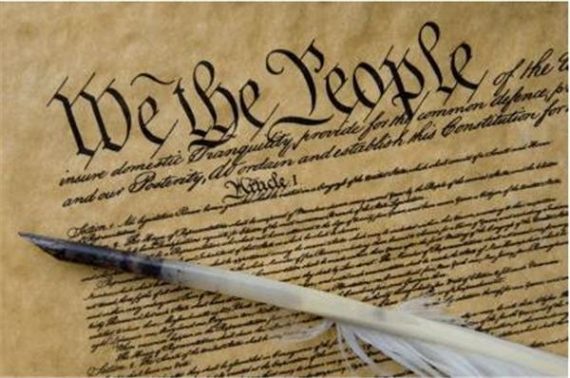Ten Congressmen Sue President Obama Over Libya Mission, War Powers Act
Dennis Kucinich and nine other Members of Congress are suing the President. They won't get very far.
Ten Members of Congress, represented by George Washington University Law Professor Jonathan Turley, have filed a lawsuit against President Obama seeking a Declaratory Judgment that he has violated the War Powers Act by failing to get Congressional approval for the mission in Libya:
Reps. Dennis Kucinich and Walter Jones continued their bipartisan quest to end the U.S. military’s participation in the conflict in Libya, filing a lawsuit Tuesday in federal court against President Obama to “challenge the commitment of the United States to war in Libya absent the required constitutional legal authority.”
The lawsuit challenges what the lawmakers see as “the executive branch’s circumvention of Congress and its use of international organizations such as the United Nations and the North Atlantic Treaty Organization to authorize the use of military force abroad, in violation of the Constitution.”
“With regard to the war in Libya, we believe that the law was violated. We have asked the courts to move to protect the American people from the results of these illegal policies,” Kucinich said in a statement announcing the suit.
The lawsuit is signed by a bipartisan group of members of the House, including Kucinich (D-Ohio), Jones (R-North Carolina), Howard Coble (R-North Carolina), John Duncan (R-Tennessee), Roscoe Bartlett (R-Maryland), John Conyers (D-Michigan) Ron Paul (R-Texas), Michael Capuano (D-Massachusetts), Tim Johnson (R-Illinois) and Dan Burton (R-Indiana).
The lawmakers say that there are seeking a court declaration that the War Powers Act was violated and an injunction against:
(1) the policy that a president may unilaterally go to war in Libya and other countries without a declaration of war from Congress, as required by Article I, Section 8, Clause 11 of the United States Constitution;
(2) the policy that a president may commit the United States to a war under the authority of the North Atlantic Treaty Organization (NATO) in violation of the express conditions of the North Atlantic Treaty ratified by Congress;
(3) the policy that a president may commit the United States to a war under the authority of the United Nations without authorization from Congress;
(4) from the use of previously appropriated funds by Congress for an unconstitutional and unauthorized war in Libya or other countries; and
(5) from the violation of the War Powers Resolution as a result of the Obama Administration’s established policy that the President does not require congressional authorization for the use of military force in wars like the one in Libya.
It all sounds very important, and it is. There are few things more important than the Separation of Powers between the Executive and Legislative Branches and the question of the proper extension of the War Power. Unfortunately, this lawsuit is most likely destined to fail just as all previous attempts to resolve this issue in the Courts have failed.
The most recent example of a case like this was Campbell v. Clinton, a case filed in Federal Court in 1999 seeking a declaration that President Clinton’s decision to commit U.S. military forces to the NATO miltiary action against Yugoslavia over the disputed territory in Kosovo. The District Court rejected the challenge on the grounds that the lawmakers in that case did not have standing to challenge a military action in Federal Court. The Court of Appeals affirmed the District Court’s decision, and pointed out quite forcefully to the lawmakers that they had other options available to them more appropriate than getting the Judicial Branch involved:
In this case, Congress certainly could have passed a law forbidding the use of U.S. forces in the Yugoslav campaign; indeed, there was a measure—albeit only a concurrent resolution—introduced to require the President to withdraw U.S. troops. Unfortunately, however, for those congressmen who, like appellants, desired an end to U.S. involvement in Yugoslavia, this measure was defeated by a 139 to 290 vote. Of course, Congress always retains appropriations authority and could have cut off funds for the American role in the conflict. Again there was an effort to do so but it failed; appropriations were authorized. And there always remains the possibility of impeachment should a President act in disregard of Congress’ authority on these matters.
The Court of Appeals also noted, however, that the lawmakers didn’t have much of a claim on the merits either:
Appellants’ constitutional claim stands on no firmer footing. Appellants argue that the War Powers Clause of the Constitution proscribes a President from using military force except as is necessary to repel a sudden attack. But they also argue that the WPR “implements” or channels congressional authority under the Constitution. It may well be then that since we have determined that appellants lack standing to enforce the WPR there is nothing left of their constitutional claim. Assuming, however, that appellants’ constitutional claim should be considered separately, the same logic dictates they do not have standing to bring such a challenge. That is to say Congress has a broad range of legislative authority it can use to stop a President’s war making, see generally John C. Yoo, The Continuation of Politics by Other Means: The Original Understanding of War Powers, 84 CAL. L. REV. 167 (1996), and therefore under Raines congressmen may not challenge the President’s war-making powers in federal court.
The Supreme Court declined to hear the appeal in this case.
The powers of the purse that the Court of Appeals references in Campbell exist for Congress in the case of the action in Libya, of course. In a post at his blog, Turley makes clear that he’s aware of the standing issue:
This is an action for injunctive and declaratory relief. In addition to challenging the circumvention of express constitutional language, it will also challenge arguments that no one (including members of Congress) has “standing” to submit this question to judicial review. These members will ask the federal district court for review of the constitutional question and for recognition that the Constitution must allow for judicial review of claims of undeclared wars under Article I.
That’s all well and good, but given the Court’s reluctance to get involved in disputes between the Legislative and Executive Branch over war powers in the past, it seems highly unlikely to me that the standing issue will be any less of a problem now than they were in 1999. In some sense the court in Campbell is right, if Congress believes the President has acted unconstitutionally, they have the power to cut off funding for the Libyan action, or even to impeach the President, if they have sufficient votes to support that action. if they don’t, I’m not at all certain that getting judges involved in this particular policy area makes any sense at all.
My prediction is that this lawsuit suffers the same fate as Campbell, assuming that it isn’t rendered moot by subsequent action.
Here’s the Complaint:







My prediction is the same.
One observation: the Campbell case was preceded by a staged vote in which the House failed to authorize air strikes in Kosovo by a tie vote. There was a vote, it failed, and each individual Congressman could argue that the power of his/her vote had been harmed by the President’s continuing actions. They had set up a much better record to claim standing that has been done here.
Has there even been any kind of vote yet?
The only vote that occurred so far was the request for further information that I noted last week.
Wouldn’t it be much easier if Congress upheld it’s responsibility and just invoked the War Powers Act (which they haven’t).
The suit is a stunt and an attempt by certain congressmen to shirk their responsibilities.
@Davebo
I agree that the suit is probably geared towards raising public awareness of the issue, and thus could be called a stunt. Not sure how you can fault these guys for shirking their responsibilities when they’re the ones pressing the issue.
Hmmm…, so how applicable would rationale behind the Wisconsin Supreme Court’s decision yesterday be to this?
What if the appellants succeed in court and Obama says something along the lines of, “They have their judgment, now let them enforce it.”? Would that be considered a high crime or misdemeanor?
It’ll be quite interesting to see how (and when) the court rules. Don’t be surprised if this gets slow-rolled.
As much as the judicial branch likes to order one or the other of the executive and legislative branches (not to mention the several states), ordering around both branches seems to be a bit more than they like to bite off.
I’ve quoted you and linked to you here.